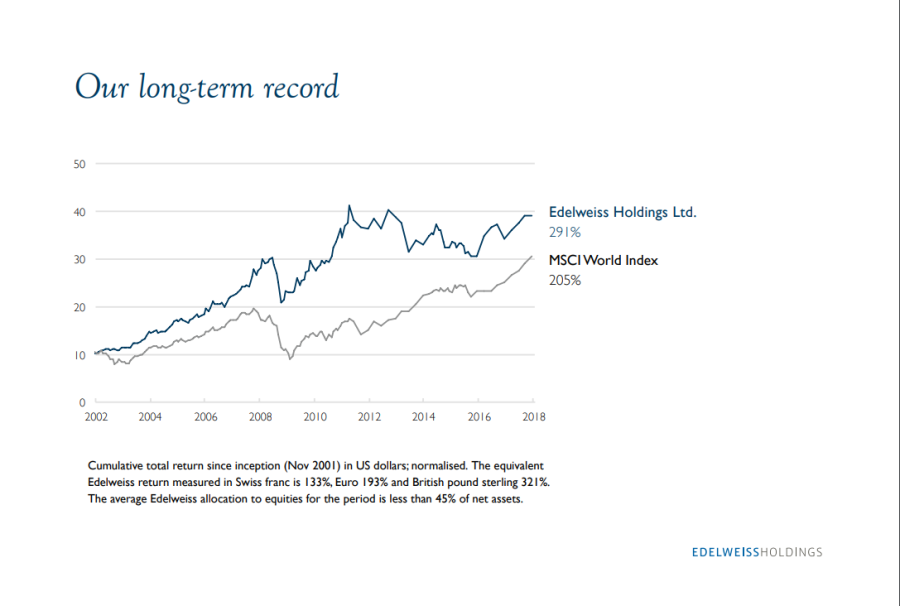To be honest, I did not know Anthony Deden, he is the founder of Edelweiss Holdings, a private investment holding company with long-term participation in the production, chemistry and technology of food, aquaculture, materials, forestry, resources and various industrial and engineering endeavours.
Recently I watched an amazing interview with Grant Williams (Real Vision) and I was fascinated by all the wisdom Anthony shared.
I started to try to find more information about him and his holding but he only has a corporate presentation on his website. His portfolio (as at 31 Dec 2017) it was formed by:
- Listed equity participation (28)—58.4%
- Unlisted investments (1)—0.8%
- Gold reserves—35%
- Cash—5.8%
The return record is quite spectacular, Edelweiss holding vs MSCI World Index.

Also, I could find some equities he owned, such as Emmi (Magallanes Value is a huge fan of this company also), Bic and TFF Group.

Some notes about the interview:
- In his 30s he started to help his mentor to manage a family wealth.
- He discovered Graham and Dobb books because of some Swiss friends in NY banks.
- He was also interested in understanding what is interest rate and money so he started to read Austrians and classical liberals.
- Quantification is not as necessary as people believed. His ideas are to focus on understanding the whole business (suppliers, products, management) that to follow the daily price of the equity.
- He changed his view about investment management (one policy for the 10/12 families he had). Investment is protecting, enhancing and deploying the capital permanently in a time horizon.
- He talked with the families he managed and ask for a time horizon and one investment policy for everyone. They finished the old investment management agreement and set up a new one.
- In 1995, 1996 and 1997 monetary policy became the driver of investing. In that period, prices of securities were going up, independently of economic
results or economic activity. In 1998 he thought it was an error in the way he knows the reality, it was wrong him or others. He started a period of soul-searching because he thought he was too old-fashioned and the world changed. So, you need to rethink the basic assumptions of what is real and what is not. - He invests in companies that were there and will be there in the future. In the first QE he though the rules changed.
- Owners vs investors. Owner businesses are far more interested in this survival of the company,
also interesting in suppliers, employees, products, etc. An investor is someone that wants to sell higher that he bought. The wealth creation is different from both of them. - The book Antifragile, in his opinion, is one of the most extraordinary books he’s read.
- “Wealth is the compounding of earnings”.
- “What can go wrong is more important than what can go right because over time you are in a marginally good business will profit, will do well.”
- My favourite part of the interview is around time 1:01:41, scarcity is the most important law in economics in that no one can have all of they want. Scarcity is a natural law, it’s just part of life there is scarcity in material goods in resources in everywhere you look at the scarcity in real savings in terms of money other than perhaps credits is being created. Scarcity is also found in skill sets, there is also scarcity among the kind of characteristics in character in men that you and I would consider to be attractive.
- The second word in his principles: permanent, he sometimes thinks to call it endurance, it’s the idea of creating a framework not only within your collection of investments but by extension within each investment nature, an investment that is designed to endure rather than merely grow.
- The third component is the idea of independence, we are quite dependent (key suppliers for example) dependence makes a system more fragile, so the more independent an organism is from external weaknesses the more likely is to set out its endurance or this strength. Bear in mind that independence is costly.
- Freedom doesn’t come free, you know you have to work.
- He called savings instead of wealth. Savings = that which is left over production – consumption.
- In today’s world he made 1 or 2 investment decision a year, in the past, 20 years ago he made 20/25 a year.
- It is important to work with people that are like-minded with you.
- His shareholder turnover it is much lower than his portfolio turnover. This is a great way to understand that his investors understand what he does and how he manages their money.
- His position in gold started in 1998, he owned gold bullion for many years, he thought it was mispriced. He owned equities but started to buy the physical metal. Also, gold provides him with the three component: scarcity, permanence and independence from the financial system.
- Two or three questions he oftentimes made:
- If I owned this whole company would I want the same people to run it?
- Would I want to own the entire company? If not, why I want to own a little bit.
- Is this business likely to be around 20 years from now?
Guiding principles:


Excellent summary of a wonderful interview Peter. I have never seen anyone speak about the world of investment the way Anthony Deden did with Grant Williams – he makes Buffet look like a high frequency trader by comparison!
LikeLike
Very true and excellent read.
Thank you. A gem in the world of prices.
LikeLike
Make perfect sense hard work pays off .
LikeLike